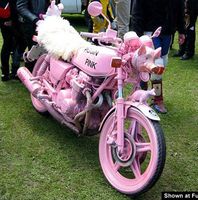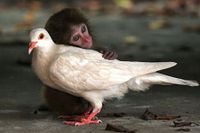Bloggfærslur mánaðarins, janúar 2008
26.1.2008 | 02:22
Mega bleikt draumahús


 passa húsin ekki vel við mig :) ekkert lítið hallærisleg mynd af mér hihi tók hana ekki sjálf tek það fram .ég hélt voða mikið upp á þessa húfu sem ég gerði fyrir einu ári siðan af því þetta var fyrsta húfan sem ég hef prjónað .'Anægð með að geta loksins klárað eitthvað á minni ævi sem var húfa
passa húsin ekki vel við mig :) ekkert lítið hallærisleg mynd af mér hihi tók hana ekki sjálf tek það fram .ég hélt voða mikið upp á þessa húfu sem ég gerði fyrir einu ári siðan af því þetta var fyrsta húfan sem ég hef prjónað .'Anægð með að geta loksins klárað eitthvað á minni ævi sem var húfa  en í leiðinni lýsir vel bleiku geðveikinni sem ég er búin að koma mér í .Aldrey þoldi ég bleikan lit ég sá allt rautt þegar einhverjum datt í hug að klæðast bleiku.En einn daginn gerðist eithvað eftir margra ára hatur mér fór að líka við bleikt
en í leiðinni lýsir vel bleiku geðveikinni sem ég er búin að koma mér í .Aldrey þoldi ég bleikan lit ég sá allt rautt þegar einhverjum datt í hug að klæðast bleiku.En einn daginn gerðist eithvað eftir margra ára hatur mér fór að líka við bleikt veit ekki afhverju og skil það ekki heldur.Þannig núna er ég með bleikt sturtuhengi ,bleik handklæði,bleika mottu,og inni í svefnherbergi bleik gluggatjöld ,og núna langar mér að mála svefnherbergið ljósbleikt og mig langar að eignast bleikt hús eins og er á myndunum hér fyrir ofan ,hvað er að gerast
veit ekki afhverju og skil það ekki heldur.Þannig núna er ég með bleikt sturtuhengi ,bleik handklæði,bleika mottu,og inni í svefnherbergi bleik gluggatjöld ,og núna langar mér að mála svefnherbergið ljósbleikt og mig langar að eignast bleikt hús eins og er á myndunum hér fyrir ofan ,hvað er að gerast  ég bara spyr þetta er ekkert lítið grunsamlegt sko og svo já líka þá langar mig í svona hans og grétu sumarbústað ég væri allavega voða vinsæl þá hjá yngri kynslóðinni :)
ég bara spyr þetta er ekkert lítið grunsamlegt sko og svo já líka þá langar mig í svona hans og grétu sumarbústað ég væri allavega voða vinsæl þá hjá yngri kynslóðinni :)

 ohhhh
ohhhh þetta hús mun einhver gefa mér í afmælisgjöf einn daginn, i wish
þetta hús mun einhver gefa mér í afmælisgjöf einn daginn, i wish 


 og svo ef ég verð ekki efnaðari en ég er í dag þá gæti ég kannski eignast þetta hús það væri alveg nóg líka
og svo ef ég verð ekki efnaðari en ég er í dag þá gæti ég kannski eignast þetta hús það væri alveg nóg líka allavega bleikt :)og svo væri sniðugt að fá sér bleikt hjól í stíl svona til að toppa þetta
allavega bleikt :)og svo væri sniðugt að fá sér bleikt hjól í stíl svona til að toppa þetta  gæti átt nokkur til tilbreytingar
gæti átt nokkur til tilbreytingar ég þarf ekkert að efast um það að verða kölluð Inga klikk ef draumurinn verður að veruleika ætli einhver myndi vilja giftast mér
ég þarf ekkert að efast um það að verða kölluð Inga klikk ef draumurinn verður að veruleika ætli einhver myndi vilja giftast mér
Lífstíll | Breytt s.d. kl. 02:36 | Slóð | Facebook | Athugasemdir (8)
24.1.2008 | 03:39
hinduismi
Who is the founder of Hinduism?Hinduism has no founder, it developed out of Brahminism. Hinduism is the oldest religion, it may date to prehistoric times. |
|
Where does the name Hindu come from?The word "Hindu" comes from the name of the river Indus, which flows 1800 miles from Tibet through Kashmir and Pakistan to the sea. |
How is Hinduism different from other faiths?Hinduism has no founder, single teacher nor any prophets. |
What do Hindus believe?For many Hindus, religion is a matter of practice rather than of beliefs. It's more what you do, than what you believe. Hindus believe in a universal soul or God called Brahman. Brahman takes on many forms that some Hindus worship as gods or goddesses in their own right. Hindus believe that there is a part of Brahman in everyone and this is called the Atman. Hindus believe in reincarnation - a belief that the soul is eternal and lives many lifetimes, in one body after another. The soul is sometimes born in a human body, sometimes in an animal body and sometimes in a plant body etc.. Hindus believe that all forms of life contain a soul, and all souls have the chance to experience life in different forms. Samsara means going through the cycle of repeated births and deaths (reincarnation). Hindus believe that existence of this cycle is governed by Karma. |
What is Karma?Hindus believe that the soul passes through a cycle of successive lives and its next incarnation is always dependent on how the previous life was lived. (Similar to Buddhist beliefs) Karma is the cause of our particular destiny. Misfortunes in our present life are the result of acts that we have committed in the past. In the same way, our actions in our present lives will determine our fate in the lives that follow. Hindus therefore aim to live in a way that will cause each of their lives to be better than the life before. |
What is Moksha?The spiritual goal of a Hindu is to become one with Brahma. This freedom is referred to as moksha. Until moksha is achieved, a Hindu believes that he/she will be repeatedly reincarnated in order that he/she may work towards self-realization of the truth (the truth being that only Brahman exists, nothing else). |
How do Hindus achieve Moksha?There are four different paths to achieve Moksha which a Hindu can take. The Hindu can choose one or all four of the paths they are: 1 The path of knowledge - Jnana-Yoga Spiritual knowledge -leading to the knowledge of the relationship between the soul (atman) and God (Brahman) 2 The path of meditation - Dhyana-yoga The idea is to concentrate so you can reach the real self within you and become one with Brahman 3 The Path of Devotion - Bhakti-yoga Choosing a particular god or goddess and worshipping them throughout your life in actions, words and deeds. 4 The path of good works - Karma-yoga This involves doing all your duties correctly throughout your life. |
Why are there so many Hindu Gods?Hindus actually only believe in one God, Brahman, the eternal origin who is the cause and foundation of all existence. The gods of the Hindu faith represent different forms of Brahman. These gods are sent to help people find the universal God (Brahman). Most Hindus have a personal god or godess such as Shiva, Krishna or Lakshmi to whom they pray regularly. The three most important Hindu gods are:
Other Hindu gods include: Saraswathi - Goddess of Wisdom - Wife of Lord Brahma. (Description) Lakshmi - Goddess of Wealth - Wife of Lord Vishnu. (Description) Parvati - Goddess Sakthi - Wife of Lord Shiva Ganesha - Son of Shiva and Parvati. (Description) |
What is Hinduism's Holy book?
The most ancient sacred texts of the Hindu religion are written in Sanskrit and called the Vedas. There are two main categories of the Hindu scriptures:
The Hindu Holy Scriptures are mainly comprised of the following works written in the Sanskrit language: 1. The Vedas Rg-Veda (Rigveda), Yajur-Veda, Sama-Veda, Atharva-Veda (see further down ) 2. The Upanisads - These consider the nature of the individual soul (Atman) and the universal soul (Brahman.) One of the Upanishads contains the earliest reference to the reincarnation of the soul in different bodies (transmigration) of the soul. 3. The Smrutis - (‘tradition) are the Laws of Manu (250 BC) 4. Ramayana - Contains the story of Rama and his devoted wife Sita. She is kidnapped by the demon king Ravana but is later freed by Rama with the help of the monkey god Hanuman. The poem is about how good will always triumph over evil and Rama and Sita are held up as role models for the perfect husband and wife. 5. Mahabharata - An epic poem telling the story of a war between two branches of a family. The Bhagavad-Gita forms part of this and means "The Song of God." 6. The Puranas - A collection of ancient tales about the different incarnations and the lives of saints. |
What are the Vedas?The Vedas are the oldest religious texts in Hinduism. The word Veda means knowledge. It is believed that the Vedas were orally revealed by Brahma to certain sages, who heard them and passed them down in an oral tradition. They were not written down; in fact this was prohibited. Because of this earliest oral tradition continuing even now when the Vedas are available in the written form, the Vedas are still known to be Sruti or shruti - ' that which is heard '. The Vedas are mainly comprised of of hymns or mantras written in the Sanskrit language. They cover various subjects, from nature to everyday life and behaviour, and form the basis of all other religious writings. The books are so special that they are often kept in glass cases. The four Vedas are:
Each Veda is divided into four sections:
The Vedas are the law. Most beliefs, concepts, and ceremonies are based on information contained in the Vedas. |
Lífstíll | Slóð | Facebook | Athugasemdir (3)
22.1.2008 | 19:15
No One Can Prevent You From Thinking about god
A little girl was playing with her toys. Her mother came into her
bedroom and said, "It is high time for you to come and eat. Stop
playing with your toys at once!"
The little girl did not pay any attention to her mother. She
continued playing and playing. So the mother became angry. She took
away all the toys and put the child straight to bed, saying, "You
never listen to me! You are so disobedient. Today I shall punish you.
I will not give you anything to eat."
Strangely enough, the little girl was not crying at all. She said to
her mother, "Do not give me any food then. I do not have to eat." In
silence the mother left the room.
When the father came home from work, he started looking for his
daughter. "Where has the child gone?" he asked his wife.
"She is in bed," said the mother.
"What happened?" the father asked.
"Our daughter is so naughty. She has become so disobedient. I
repeatedly asked her to come and eat, come and eat. She would not
listen to me. So I took away all her toys and put her to bed without
giving her any food. In this way, she will become very hungry and she
will learn to come and eat when I call her. I am teaching her
obedience."
The little girl was lying in bed. Her father entered the room and
asked sympathetically, "What has happened? What has happened?
She replied, "Nothing has happened. I am still thinking what I was
thinking."
"What do you mean you are thinking what you were thinking?" asked the
father.
The little girl started to reply, "I am thinking!" but her father
interrupted.
"You do not have to eat?"
"No," she said, "I do not have to eat."
"Then you do not feel sad that all your toys were removed?"
"No, I do not feel sad," she replied.
"Why?" he asked curiously.
"Because I am still thinking the same thing," explained the little
girl. "Whatever I was thinking before, I am now thinking. And this
thought is giving me so much joy. Mother can prevent me from eating.
She can prevent me from playing, but she cannot prevent me from
thinking."
"What are you thinking?" asked her father, at last.
"I am thinking that some day I will be God's most favourite child. I
will become a good child and then I will be God's favourite. That
thought my mother cannot take away from me."
Her father was so deeply moved. He said, "Today you have taught me
something. From you I have learnt the Message of God."
At that moment the mother entered the room. When the father told her
what their daughter was thinking, she embraced the child. Both the
parents said to their daughter, "Do not stop thinking this precious
thought. We shall follow you. What you are thinking, we shall also
try to think. You have taught us what to think of in life."
Lífstíll | Slóð | Facebook | Athugasemdir (3)
14.1.2008 | 05:15
Heilræði móður teresu
Heilræði Móður Teresu:
~ Fyrirgefðu því, þrátt fyrir það.
Ef þú sýnir öðrum góðvild, mun fólk hugsanlega ásaka þig
um sjálfselsku og annarlegar hvatir:
~ Sýndu öðrum góðvild, þrátt fyrir það.
Njótir þú velgengni munt þú eignast einhverja falska vini og raunverulega óvini:
~ Stefndu að velgengni, þrátt fyrir það.
Heiðarleiki og hreinskilni geta gefið höggstað á þér:
~ Vertu heiðarleg(ur) og hreinskilin(n), þrátt fyrir það.
Það sem tekur þig mörg ár að byggja upp, gæti einhver eyðilagt á einum degi:
~ Byggðu upp, þrátt fyrir það.
Það góða sem þú gerir í dag, gleymir fólk oft á morgun:
~ Haltu áfram að gera góðverk, þrátt fyrir það.
Þótt þú gefir heiminum það besta sem þú sem þú átt, verður það aldrei nóg:
~ Haltu áfram að gefa heiminum það besta sem þú átt, þrátt fyrir það.
Sjáðu til, þegar allt kemur til alls, er þetta á milli þín og Guðs:
~ Það var aldrei á milli þín og þeirra, þrátt fyrir allt.”

Heilræði heilags Padre Pio
“Við verðum að muna að trúin er mesta gjöfin
sem Guð hefur boðið manni á þessari jörð,
því að úr jarðneskum manni verður til þegn Himnaríkis.
Við skulum gæta þessarar gjafar af mikilli kostgæfni.
Vei þeim sem gleymir sér; sem gleymir Himnaríki;
þeim sem leyfir trúnni að dofna;
eða það sem verra er, afneitar trú sinni.
Þetta er mesta lítilsvirðing sem hægt er að sýna Guði.”Friðarbæn (Hl. Frans frá Assisi)
Drottinn, ger þú mig að farvegi friðar þíns, svo að ég færi kærleika þangað sem hatur er, fyrirgefningu þangað sem móðgun er, einingu þangað sem sundrung er, trú þangað sem efi er, sannleika þangað sem villa er, von þangað sem örvænting er, gleði þangað sem harmur er, ljós þangað sem skuggi er.
Veit þú, Drottinn, að ég sækist fremur eftir að hugga en láta huggast, skilja en njóta skilnings, elska en vera elskaður, því að okkur gefst ef við gefum, við finnum sjálf okkur ef við gleymum okkur sjálfum, okkur fyrirgefst ef við fyrirgefum og fyrir dauðann fæðumst við til eilífs lífs.
Amen.
Lífstíll | Slóð | Facebook | Athugasemdir (4)
12.1.2008 | 00:38
2008
ég mér markmið á síðasta ári sem ég ætlaði að standa við sem leit svona út
framtiðarplanið mitt /áhuginn 1 til 10
1 )hugleiðslunámskeið 10 (búið)
2 )finna fallegt husnæði á fyrstu hæð 10(fann ekki flyt aftur í sama)
3 )dans /kramhúsið 10
4 )líkamsækt 3svar í viku 10(fór í 1 mánuð :)
5 )kung fu fyrir soninn með innifalinni hugleiðslu förum saman i það 10 fyrir hann 8 mig
6)hætta að reykja/tungurótar töflur og dropana :) 10 (hætt)
7)læra song hjá heru /helgarnamskeið 10
8 )matreiðslunámskeið sollu 8
9 )finna mér tima á hverjum degi til að hugleiða 10 (náði ekki að hugleiða daglega bara fyrstu 3 mánuðina svo óreglulega)
10 )læra einkaþjalfarann 10
11)jogakennarann 10
já þá þarf ég að klára þetta árið 2008 sem ég gat ekki klárað 2007 :)samt hef ég ekki lengur áhuga á söng og kung fu stroka það bara út
ÁRAMÓTAHEITIÐ MITT Í ÁR ER AÐ LÁTA ENGAN HAFA ÁHRIF Á MÍNAR ÁÆTLANIR GERA ÞAÐ SEM ÉG VIL GERA Í LÍFINU EKKI ÞAÐ SEM ER ÆTLAST TIL AF MÉR .LÍTA ALLTAF Á BJÖRTU HLIÐARNAR Á MÁLUNUM. SKOÐA ÞAÐ SEM ÉG HEF, Í STAÐIN FYRIR ÞAÐ SEM ÉG HEF EKKI .OG SVO ÁKVAÐ ÉG AÐ GERA ALLT SEM ÉG ÓTTAST .TIL ÞESS AÐ LOSNA VIÐ HRÆÐSLUNA SEM ÉG HEF Á VISSUM HLUTUM Í LÍFINU .þÁ ENDA ÉG VONANDI UPPI MEÐ ÞVÍ AÐ VERA ÓTTALAUS EINS OG HÖRÐUSTU GLÆPAMENNIRNIR ERU
EINS OG HÖRÐUSTU GLÆPAMENNIRNIR ERU  ÞANNIG ÆTLA ÉG AÐ VERÐA MUAHHHH
ÞANNIG ÆTLA ÉG AÐ VERÐA MUAHHHH
Lífstíll | Slóð | Facebook | Athugasemdir (4)
6.1.2008 | 14:40
flutningur
jammm núna er ég að fara flytja á stað sem er ekkert net  ég fæ smá hroll við tilhugsunina en samt ánægð á þann hátt að ég vil ekki eyða svona miklum tíma í tölvu eins og ég hef gert .allt í lagi að kikja í tölvuna 1 til 3 svar sinnum í viku .'Eg hef löngun í að eyða tímanum í eitthvað viturlegra eins og hugleiða meira, hreyfa mig meira,teikna,mála,lesa,taka myndir,bara skapa mér gott og fallegt líf .'Eg geri mér grein fyrir því að það er bara ég sem get skapað mér gott líf .'Eg get ekki beðið eftir að það breytist ef ég geri ekkert sjálf.'Eg þurfti svoldið langan tíma til að fatta það ég beið alltaf eftir að verða hamingjusöm án þess að gera neitt í því. ekkert gasalega sniðugt
ég fæ smá hroll við tilhugsunina en samt ánægð á þann hátt að ég vil ekki eyða svona miklum tíma í tölvu eins og ég hef gert .allt í lagi að kikja í tölvuna 1 til 3 svar sinnum í viku .'Eg hef löngun í að eyða tímanum í eitthvað viturlegra eins og hugleiða meira, hreyfa mig meira,teikna,mála,lesa,taka myndir,bara skapa mér gott og fallegt líf .'Eg geri mér grein fyrir því að það er bara ég sem get skapað mér gott líf .'Eg get ekki beðið eftir að það breytist ef ég geri ekkert sjálf.'Eg þurfti svoldið langan tíma til að fatta það ég beið alltaf eftir að verða hamingjusöm án þess að gera neitt í því. ekkert gasalega sniðugt .
.
Þannig núna er ég að fara í fína íbúð þar sem ég mun búa með syni mínum. það er í fyrsta skipti sem ég bý í íbúð án fullorðins karlmanns  það verður skrýtið en það er það sem ég vil þannig mig hlakkar bara til að byrja nýtt líf og ég
það verður skrýtið en það er það sem ég vil þannig mig hlakkar bara til að byrja nýtt líf og ég  vona að 2008 verði mitt besta
vona að 2008 verði mitt besta
Lífstíll | Slóð | Facebook | Athugasemdir (5)
1.1.2008 | 21:47
What i am
WHAT I AM
In Heaven
I am a descending promise.
On earth
I am an ascending hope.
In God
I am a weeping prayer.
I SEE
I see the hand that leads me.
Its name is duty.
I see the heart that feeds me.
Its name is purity.
I see the soul that frees me.
Its name is beauty.
I see the God who wields me.
His Name is Necessity.
THE GOAL OF THE BEYOND
Obey and trust,
Trust and obey.
Indeed, this is the short way
To the Goal of the Beyond.
Love and serve,
Serve and love.
Indeed, this is the shorter way
To the Goal of the Beyond.
Surrender and offer,
Offer and surrender.
Indeed, this is the shortest way
To the Goal of the Beyond.
AN EXTRA SOUL
It is an extra eye
That sees God's Beauty,
And
That eye is my heart.
It is an extra heart
That feels God's Satisfaction,
And
That heart is my soul.
It is an extra soul
That becomes God's Perfection,
And
That soul is God.
WHEN I LIVE IN THE HEART
When
I live in the mind,
I think I know
More than I really know.
When
I live in the heart,
I know I am loved
More than I really love.
LOOK FOR THE GOOD
Look for the good:
Everything is God,
Everyone is God.
Look for God:
Everything is good:
Everyone is good.
Look for the good in me;
I shall not confuse you.
Look for the God in me;
I shall not disappoint you.
LEAN UPON ME
Lean upon my heart.
I shall give you
What I have and what I am:
Aspiration-drop.
Lean upon my soul.
I shall give you
What God has and what God is:
Compassion-Sea.
THE SEED
Her God is the Seed
Of eternal Silence.
Her soul is the seed
Of celestial Freedom.
Her heart is the seed
Of universal Love.
Her life is the seed
Of immortal Bliss.
~ Sri Chinmoy
Lífstíll | Slóð | Facebook | Athugasemdir (4)

 What is the symbol of Hinduism?
What is the symbol of Hinduism?


 Lakshmi is the goddess of light, beauty, good fortune and wealth.
Lakshmi is the goddess of light, beauty, good fortune and wealth.  Most Hindus worship (puja) every day at home and have a shrine there. A shrine can be anything from a room, a small altar or simply pictures or statues. Family members often worship together.At the shrine, Hindus make offerings to a murti. A murti is a sacred stautue of God, or a god or goddess.
Most Hindus worship (puja) every day at home and have a shrine there. A shrine can be anything from a room, a small altar or simply pictures or statues. Family members often worship together.At the shrine, Hindus make offerings to a murti. A murti is a sacred stautue of God, or a god or goddess.  Hinduism does not just have one sacred book but several scriptures. The Vedas scriptures guide Hindus in their daily life. They also help to preserve the religious dimensions of family and society. Hindus have developed their system of worship and beliefs from the scriptures.
Hinduism does not just have one sacred book but several scriptures. The Vedas scriptures guide Hindus in their daily life. They also help to preserve the religious dimensions of family and society. Hindus have developed their system of worship and beliefs from the scriptures.


 agny
agny
 malacai
malacai
 alheimurinn
alheimurinn
 beggabjuti
beggabjuti
 brjann
brjann
 brandarar
brandarar
 austurlandaegill
austurlandaegill
 saxi
saxi
 ellyarmanns
ellyarmanns
 ellahelga
ellahelga
 erla1001
erla1001
 erna-h
erna-h
 kamilla
kamilla
 finder
finder
 gilsneggerz
gilsneggerz
 gudmundurhelgi
gudmundurhelgi
 zeriaph
zeriaph
 gtg
gtg
 heidistrand
heidistrand
 heidihelga
heidihelga
 heringi
heringi
 jensgud
jensgud
 enoch
enoch
 jonhjorleifur
jonhjorleifur
 prakkarinn
prakkarinn
 angel77
angel77
 kallimatt
kallimatt
 kreppu
kreppu
 krist
krist
 lauola
lauola
 leifurl
leifurl
 vonin
vonin
 larusg
larusg
 ludvik
ludvik
 mofi
mofi
 perlaoghvolparnir
perlaoghvolparnir
 ragganagli
ragganagli
 ruth777
ruth777
 lovelikeblood
lovelikeblood
 straitjacket
straitjacket
 scorpio
scorpio
 svavaralfred
svavaralfred
 laufabraud
laufabraud
 josira
josira
 asdisran
asdisran
 poppoli
poppoli
 aronsky
aronsky





